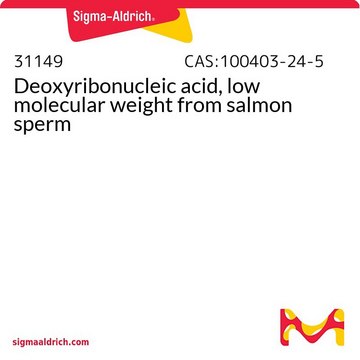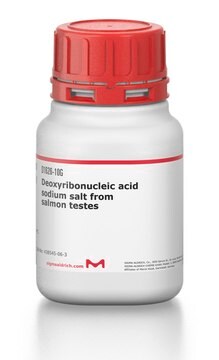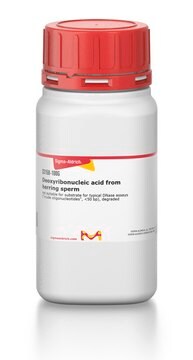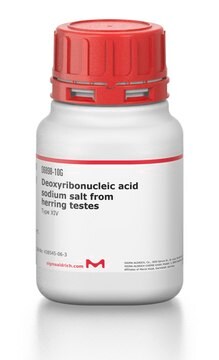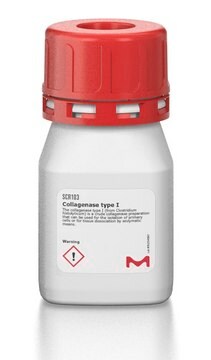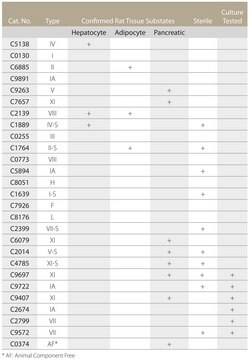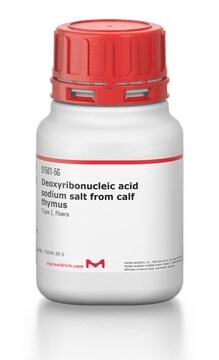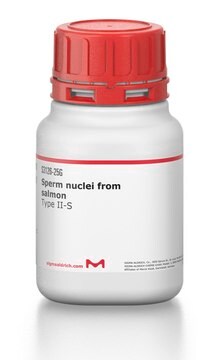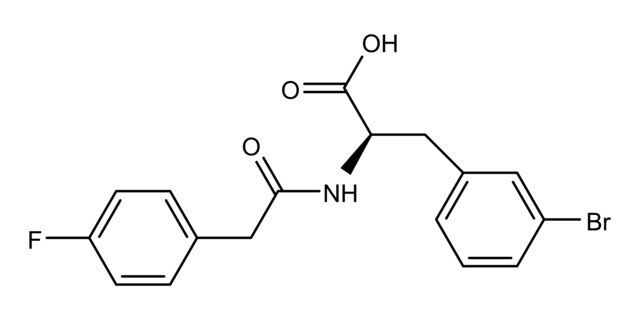D7290
Deoxyribonucleic acid from herring sperm
single-stranded for hybridization
Sinonimo/i:
DNA
Autenticatiper visualizzare i prezzi riservati alla tua organizzazione & contrattuali
About This Item
Numero CAS:
Numero CE:
Numero MDL:
Codice UNSPSC:
41106310
eCl@ss:
32160414
NACRES:
NA.52
Prodotti consigliati
Origine biologica
(herring sperm)
Grado
Molecular Biology
for molecular biology
Stato
solution
Condizioni di spedizione
dry ice
Temperatura di conservazione
−20°C
Descrizione generale
Suitable for use as a blocking agent in Southern hybridizations.
Applicazioni
Deoxyribonucleic acid from herring sperm is suitable for use as a blocking agent in Southern hybridizations. It was used in preparation of brain sections of mice for BrdU immunohistochemistry. It was also used for hybridization reaction of dot blot membranes.
In order to decrease any non-specific hybridization of the probe to a substrate, blocking agents must be used. Generally, a combination of blocking reagent, detergent, and denatured, fragmented DNA is used to accomplish this. Sigma offers sonicated, denatured DNA from a variety of species for use as a blocking agent in Northern and Southern blotting and other nucleic acid hybridization techniques.
Many factors contribute to the signal-to-noise ratio in nucleic acid hybridizations. These factors include the presence of solvent (formamide), hybridization temperature, length of hybridization, volume of hybridization solution, degree and method of agitation, use of blocking reagents, concentration and specific activity of the probe, use of molecular agents to increase the rate of nucleic acid reassociation, and the degree of stringency used during the washing of the membrane.
In order to decrease any non-specific hybridization of the probe to a substrate, blocking agents must be used. Generally, a combination of blocking reagent, detergent, and denatured, fragmented DNA is used to accomplish this. Sigma offers sonicated, denatured DNA from a variety of species for use as a blocking agent in Northern and Southern blotting and other nucleic acid hybridization techniques.
In order to decrease any non-specific hybridization of the probe to a substrate, blocking agents must be used. Generally, a combination of blocking reagent, detergent, and denatured, fragmented DNA is used to accomplish this. Sigma offers sonicated, denatured DNA from a variety of species for use as a blocking agent in Northern and Southern blotting and other nucleic acid hybridization techniques.
Nota sulla preparazione
This DNA is phenol-chloroform extracted, ethanol precipitated, and sonicated to produce single-stranded fragments which comigrate with the 587 and 831 base pair marker fragments.
Altre note
DNA in solution will reanneal on standing at room temperature so it is recommended to boil the solution for 10 minutes and then cool on ice for at least 5 minutes prior to use.
Prodotti correlati
N° Catalogo
Descrizione
Determinazione del prezzo
Codice della classe di stoccaggio
11 - Combustible Solids
Classe di pericolosità dell'acqua (WGK)
WGK 3
Punto d’infiammabilità (°F)
Not applicable
Punto d’infiammabilità (°C)
Not applicable
Dispositivi di protezione individuale
Eyeshields, Gloves, type N95 (US)
Scegli una delle versioni più recenti:
Possiedi già questo prodotto?
I documenti relativi ai prodotti acquistati recentemente sono disponibili nell’Archivio dei documenti.
I clienti hanno visto anche
Marloes Prins et al.
PloS one, 8(12), e83835-e83835 (2014-01-01)
Multiple sclerosis (MS) has been mainly attributed to white matter (WM) pathology. However, recent evidence indicated the presence of grey matter (GM) lesions. One of the principal mediators of inflammatory processes is interleukin-1β (IL-1β), which is known to play a
Hanbin Ma et al.
Scientific reports, 3, 2730-2730 (2013-09-26)
Herein, we describe a novel integrated biosensor for performing dielectric spectroscopy to analyze biological samples. We analyzed biomolecule samples with different concentrations and demonstrated that the solution's impedance is highly correlated with the concentration, indicating that it may be possible
Simon A Joosse et al.
BMC cancer, 7, 43-43 (2007-03-09)
Array Comparative Genomic Hybridization (aCGH) is a rapidly evolving technology that still lacks complete standardization. Yet, it is of great importance to obtain robust and reproducible data to enable meaningful multiple hybridization comparisons. Special difficulties arise when aCGH is performed
Minna M Poranen et al.
Journal of virology, 80(16), 8081-8088 (2006-07-29)
Virus-induced changes in cellular gene expression and host physiology have been studied extensively. Still, there are only a few analyses covering the entire viral replication cycle and whole-host gene pool expression at the resolution of a single gene. Here we
Nicholas A Shackel et al.
Hepatology (Baltimore, Md.), 38(3), 577-588 (2003-08-27)
Pathogenic molecular pathways in cirrhotic liver diseases such as hepatitis C virus (HCV), autoimmune hepatitis (AIH) and primary biliary cirrhosis (PBC) are poorly characterized. Differentially expressed genes are often important in disease pathogenesis. Suppression subtractive hybridization (SSH) is a genome-wide
Il team dei nostri ricercatori vanta grande esperienza in tutte le aree della ricerca quali Life Science, scienza dei materiali, sintesi chimica, cromatografia, discipline analitiche, ecc..
Contatta l'Assistenza Tecnica.